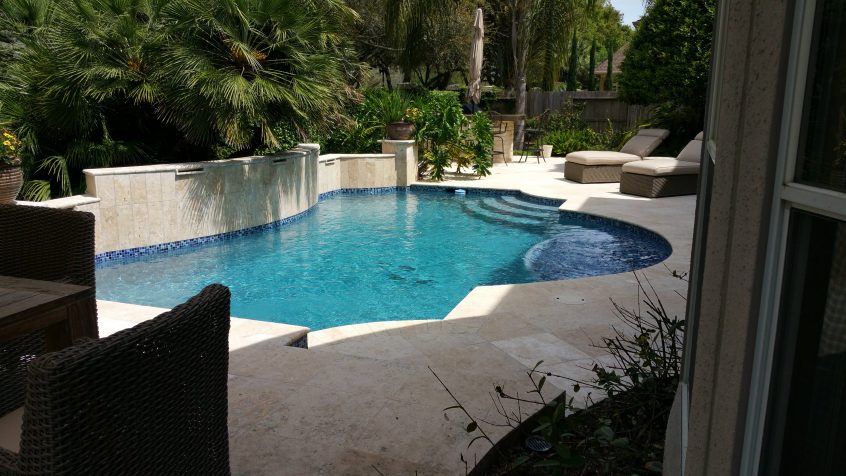This page is here to help inform you about the pool tile cleaning process. We hope you find it useful but if we do not address all of your questions, please don’t hesitate to give us a call at 281-235-3669 or email us at [email protected] and we will do our very best to help you.
What is the white stuff at the waterline of our pool?
This is usually a calcium carbonate build up known as scale. Though other minerals and organic material can be present in a scale line, it is primarily a calcium phenomenon. As water evaporates it leaves behind all dissolved minerals. Just remember back to your elementary science class when salt water was left in a glass and allowed to evaporate. The salt was left behind because of the same chemical principles that cause scale.
What causes scale?
Scale can be caused by pool water that is out of balance in a number of different ways. If one or more of the pool water parameters are not in an acceptable range, calcium deposits can occur. A high calcium hardness reading of above 1000 ppm(hard water), a high pH of over 7.8, or a high alkalinity reading of over 120 can contribute to scale.
Can’t I clean my tile with a pumice stone or Kalcium Killer?
Yes you can. However we don’t recommend using pumice stones. Cleaning with a pumice stone takes a lot of time and effort. Depending on the amount of calcium build up this could take hours and hours over several weekends. And contrary to what your pool store or pumice packaging may say, pumice does scratch the tile surface. We see this all the time.
How do we clean pool tile?
We use low pressure compressed air that has been dried to deliver the blast media to the affected area.
Do you need to drain my pool?
This depends on several factors such as the type of tile you have and the blast media that will be used to remove the scale. In most cases, no, we do not need to drain your entire pool. We lower the water level 8 to 10 inches using one of our industrial grade pumps.
Can you clean Pebble Tec or pebble equivalents?
Yes. Cleaning Pebble Tec is not a problem. We typically use glass bead to clean the calcium from Pebble Tec because its small size can get into all the little nooks and crannies of the Pebble Tec. Most companies cannot clean Pebble Tec because they use pressure washers to deliver the blast media. The pressure washers use upwards of 3,000 psi of water pressure and can blow out the tiny pebbles in your Pebble Tec. Since we are using compressed air to deliver our media, we generally shoot pebble bottoms at 30 to 50 psi, a considerably lower pressure, so there is no problem with pebbles blowing out.
How long does the process take?
The amount of calcium build up determines how long it will take us to finish the job. Most jobs take from 2 to 4 hours from start to finish depending on the amount of tile to be blasted and media being used.
Will the blast media make a mess in my pool?
No. The most common blast media for scale removal is glass beads that will sink to the bottom of the pool during the blasting process. Once complete, we use a portable vacuum system to clean the media from the pool bottom. Your water may appear slightly cloudy from the suspended calcium but it will be filtered out and your water should be crystal clear in a day or two.
Can you seal my pool tile after it is cleaned?
We can. However we don’t recommend it. Tile sealers only make the job much harder the next time you need to clean the tile and may turn yellow or white after 6 months. Many companies will offer free tile sealing after they are done usually because they are operating small air compressors at very high pressures. In this configuration, the glass beads are accelerated to a speed that will cause damage to the tile glaze. Sealing the tile covers up the damage from improper tile cleaning.
How long will my tile or Pebble Tec stay clean?
This depends on two factors. How well you maintain your pool chemistry and what the calcium level is in your tap water. Texas water has a very high mineral content and this is a continuous problem we must deal with.
Can I prevent scale in the future?
Once the scale is gone, in order to prevent future calcium deposits, test the calcium hardness, pH, and alkalinity parameters of the pool water and bring them into an acceptable range. If the calcium hardness level is high, consider a partial water replacement for the pool. But before replacing any water be sure to test the calcium hardness of the fill water to make sure it will help. If the fill water already has a high calcium hardness reading, most likely scale will continue to be a problem. Also, using products that help keep metals in solution will retard the process of scale buildup.
Do I have to be home during the pool tile cleaning?
No. You do not need to home for us to clean your calcium line. We just need access to your back yard.
When can I use my pool again?
You can start swimming immediately after the cleaning process is complete. The water will be cloudy after we are done cleaning but is safe to swim in.

